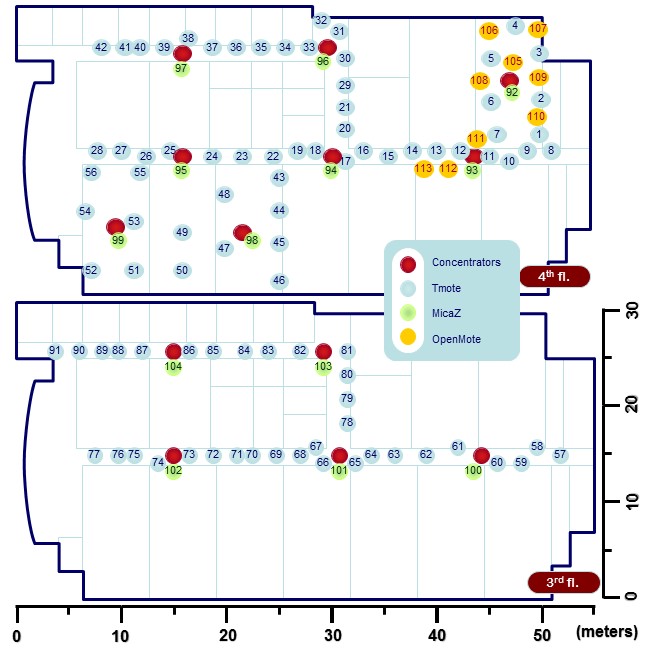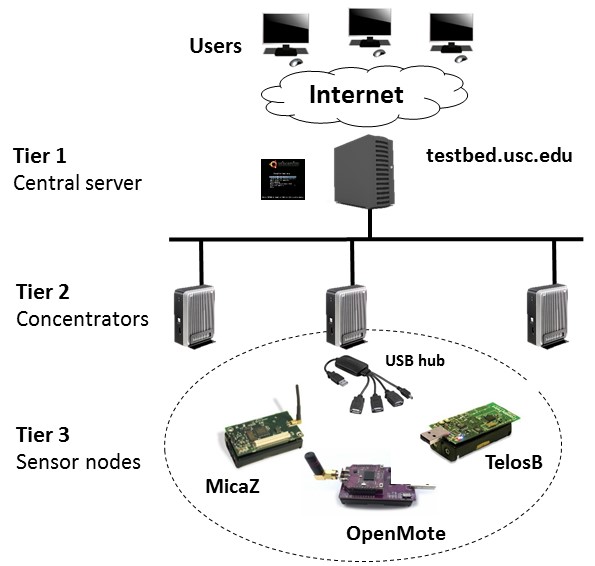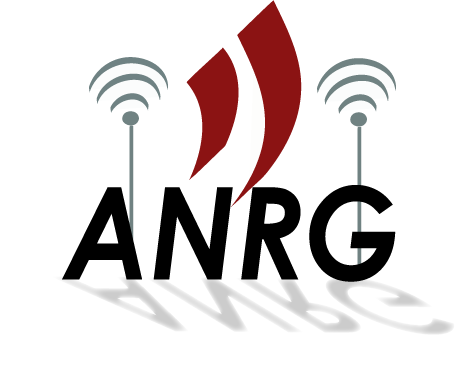Tutornet: A Low Power Wireless IoT Testbed
Overview
Tutornet is a low-power wireless network testbed deployed at the Ming Hsieh Department of Electrical Engineering at the University of Southern California (USC). It is extensively used for research and teaching at USC.
Tutornet is currently composed of 113 sensor nodes (91 TelosB, 13 MicaZ, 9 OpenMote) covering two adjacent floors in the Ronald Tutor Hall building. It features three generations of wireless sensor nodes, all with IEEE802.15.4-compliant radios operating on the 2.4 GHz frequency band.
Layout
The figure below shows the layout of the two floors with the arrangement of the sensor and concentrator nodes.

Sensor nodes
The table below summarizes the main features of sensor nodes employed in the Tutornet.

Architecture
Tutornet has a three-tier heterogeneous architecture depicted below.
At Tier 1, a central server is responsible for the testbed reservation system and for redirecting communication between the sensor nodes and the remote user.
At Tier 2, 13 concentrator nodes are physically connected through USB cables to the sensor nodes, and through Ethernet cables to the central server.
At Tier 3, 113 sensor nodes use USB cables as a communication back-haul and as power source.
The central server runs Ubuntu Linux, the reservation system is an Apache-based web server with software written in Perl+MySQL for controlling users privileges.
The concentrator nodes are Raspberry-Pi-like computers running Ubuntu Linux.
Each concentrator has a USB-hub supporting up to 10 devices.
All concentrators are connected to the central server using a high-speed Ethernet network based on Power-Line Communication (PLC) protocol.

Datasets
Dataset 1 – PDR between 40 nodes on 4th floor in JSON format (download)
Dataset 2 – PDR between 55 nodes on 4th floor in raw format (download)
Dataset 3 – Averaged PDR between 55 nodes on 4th floor in raw format (download)
Published Work
- Pedro Henrique Gomes, Ying Chen, Thomas Watteyne and Bhaskar Krishnamachari, “Insights into Frequency Diversity from Measurements on an Indoor Low Power Wireless Network Testbed“, Workshop on Low-Layer Implementation and Protocol Design for IoT Applications (IoT-LINK), IEEE Global Communications Conference (GLOBECOM), 2016.
- Pedro Henrique Gomes, Thomas Watteyne, Pradipta Ghosh, Bhaskar Krishnamachari, “Reliability through Timeslotted Channel Hopping and Flooding-based Routing“, ACM International Conference on Embedded Wireless Systems and Networks (Dependability Competition), EWSN 2016.
- Ying Chen, Pedro Henrique Gomes, Bhaskar Krishnamachari, “Multi-Channel Data Collection for Throughput Maximization in Wireless Sensor Networks“, IEEE International Conference on Mobile Ad hoc and Sensor Systems (MASS), 2014.
- Revathi Venkataraman, Scott Moeller, Bhaskar Krishnamachari, Rama Rao T., “Trust-based Backpressure Routing in Wireless Sensor Networks“, International Journal of Sensor Networks (IJSNet), 2014.
- Scott Moeller, Avinash Sridharan, Bhaskar Krishnamachari, Omprakash Gnawali, Routing Without Routes: The Backpressure Collection Protocol, IPSN, April, 2010, Winner of IP Track Best Paper Award
- Jiong Jin, Avinash Sridharan, Bhaskar Krishnamachari, and Marimuthu Palaniswami, “Handling Inelastic Traffic in Wireless Sensor Networks“, IEEE Journal on Selected areas in communications (JSAC), 2010.
- Avinash Sridharan and Bhaskar Krishnamachari, Explicit and Precise Rate Control for Wireless Sensor Networks, ACM Sensys, November, 2009
- Sumit Rangwala, Ramakrishna Gummadi, Ramesh Govindan and Konstantinos Psounis, Interference-Aware Fair Rate Control in Wireless Sensor Networks, in Proceedings of ACM SIGCOMM Symposium on Network Architectures and Protocols, September 2006
- Omprakash Gnawali, Rodrigo Fonseca, Kyle Jamieson, David Moss, Philip Levis, Collection Tree Protocol, In Proceedings of the Seventh ACM Conference on Embedded Networked Sensor Systems (SenSys 2009), Berkeley, CA, November 4-6, 2009
People
Pedro Henrique Gomes, Admin
Kwame-Lante Wright
Pradipta Ghosh
Jason Tran
Nachikethas A. Jagadeesan
Bhaskar Krishnamachari, Director
Tutornet was previously deployed and managed by the Embedded Networks Laboratory at USC, directed by Prof. Ramesh Govindan.
